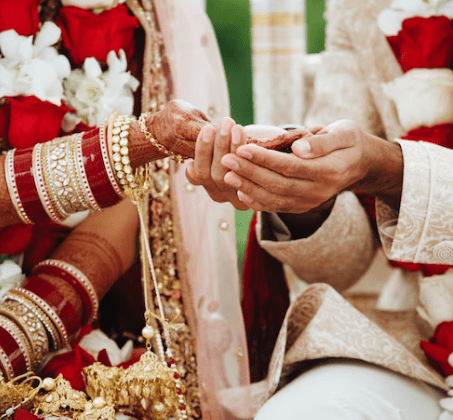Marriage Counseling and Therapy

Our Services
Marriage Counseling and Therapy
Marriage counseling, also known as couples therapy or marriage therapy, involves couples seeking guidance from a trained therapist or counselor to address conflicts and challenges within their relationship.
This form of counseling aims to improve the quality of the relationship, enhance communication, and provide tools for resolving issues effectively.
Know More About Marriage Counseling
Types of Marital Therapy Techniques
🔹 Emotionally Focused Therapy: Focuses on identifying and addressing emotional needs and attachment patterns in the relationship.
🔹 Cognitive-Behavioral Therapy: Aims to change negative thought patterns and behaviors that contribute to conflicts.
🔹 Imago Relationship Therapy: Helps couples explore their childhood experiences and how they influence their current relationship dynamics.
🔹 Solution-Focused Therapy: Focuses on identifying solutions and strengths within the relationship rather than dwelling on problems.
🔹 Insight-Gaining Therapy: A form of therapy that aims to increase self-awareness and understanding of relationship dynamics.
🔹 Positive Psychology Therapy: Focuses on enhancing positive aspects of the relationship, such as strengths and resilience.
Who May Benefit from Marriage Counseling
🔹Differences in religious beliefs or moral values.
🔹Frequent criticism and negative interactions within the relationship.
🔹High levels of defensiveness when discussing issues.
🔹A tendency to emotionally distance themselves from each other.
🔹Feelings of disdain or anger toward each other.
🔹Poor communication skills within the relationship.
🔹A sense of disinterest or lack of connection with one’s partner.
🔹Significant differences in interests or activities.
🔹A sense of growing emotional distance or disconnection from one’s partner.
Issues Marriage Counseling Can Help With
🔹Divorce
🔹Substance abuse
🔹Physical or mental health conditions
🔹Same-sex relationship challenges
🔹Cultural differences and clashes
🔹Financial difficulties
🔹Unemployment-related stress
🔹Blended family dynamics
🔹Communication problems
🔹Sexual issues or difficulties
🔹Conflicts related to child-rearing
🔹Infertility-related stress
🔹Anger management
🔹Adjusting to changing roles, such as retirement
Benefits of Marriage Counseling
🔹Enhanced transparency when discussing relationship issues.
🔹Improved communication skills and clarity in interactions.
🔹A better understanding of each other’s perspectives and needs.
🔹Collaborative decision-making and problem-solving within the relationship.
🔹The opportunity for personal growth and self-improvement.
🔹Strengthening the bond and connection between partners.
Marriage Counseling: How It Can Help
Marriage counseling is provided by licensed family and marriage therapists who specialize in addressing issues within couples’ relationships. This therapeutic process can vary in duration, with some couples requiring only a few sessions to navigate a specific emotional crisis, while others may engage in longer-term counseling, especially when their relationship has significantly deteriorated. Similar to individual psychotherapy, couples typically meet with a marriage counselor at least once a week.
Who Can Benefit from Marriage Counseling?
The reality is that most marriages and relationships are not always perfect. Each person brings their unique beliefs, values, opinions, and personal experiences into the relationship, and these differences may not always align with their partner’s. However, these differences do not necessarily lead to conflict; in fact, they can be beneficial, fostering understanding, respect, and acceptance of diverse viewpoints and backgrounds.
Yet, relationships can face challenges. Traits or differences once considered pleasant may become sources of frustration over time. Specific issues, such as extramarital affairs or a loss of sexual attraction, can strain relationships. Gradual declines in affection and emotional connection can also occur.
Regardless of the cause, a breakdown in a relationship can lead to anxiety, tension, sadness, and even depression. Ignoring these problems with the hope they will resolve themselves can lead to further deterioration and potentially affect one’s mental and physical health. Relationship issues can spill over into other areas of life, including work, friendships, and family relationships.
How Can Marriage Counseling Help?
Marriage counseling typically involves couples or partners attending therapy sessions together. A trained family and marriage therapist assists couples in identifying and understanding the underlying causes of their conflicts and works toward resolving these issues. The process involves examining both the positive and negative aspects of the marriage.
Online marriage counseling can equip couples with tools to strengthen their relationship. These skills may include improving communication, problem-solving together, and addressing disagreements in a rational and constructive manner. In certain cases, such as those involving substance abuse or mental illness, marriage counselors may collaborate with other healthcare professionals to provide comprehensive care.
Marriage Counseling Sessions: What to Expect
Engaging in marriage counseling can be a challenging process. Sessions may involve discussing past mistakes, and conflicts can arise during therapy, leading to arguments and emotional outbursts. However, these challenges are part of the therapeutic process. A skilled counselor can serve as a mediator or facilitator, helping couples navigate these turbulent emotions without taking sides or exacerbating conflicts.
It’s important to note that improvement in the relationship can begin after just a few sessions. However, in some cases, couples may realize that their differences are irreconcilable, and they may choose to end the relationship.
Marriage Counseling When One Partner Isn’t Willing ?
If one partner is unwilling to attend marriage counseling, the other can still benefit from individual counseling. This can provide insights into their own behavior and reactions within the relationship. While couples counseling is most effective when both partners participate, individual counseling can help individuals develop coping strategies and better understand their role in the relationship dynamics.
In cases where one partner is initially resistant, open communication about the benefits of counseling and a willingness to work on personal growth and change can sometimes encourage them to join the process later on. Ultimately, the decision to attend counseling should be voluntary and based on each individual’s readiness and willingness to engage in the therapeutic process.
